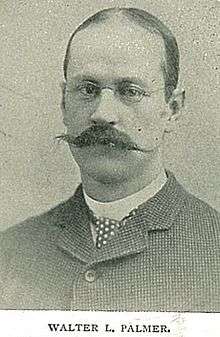Walter Launt Palmer
Walter Launt Palmer (August 1, 1854 – April 16, 1932) was an American Impressionist painter. Palmer's father Erastus Dow Palmer was a prominent sculptor, and the family residence was frequented by his father's friends, notably Frederic Edwin Church.[1] Palmer began his formal artistic training under portrait painter Charles Loring Elliott, but it was Church, the period's premier landscape artist, who later tutored the young Palmer in landscape painting.[2][3]
Walter Launt Palmer | |
|---|---|
 | |
| Born | August 1, 1854 |
| Died | April 16, 1932 (aged 77) Albany, New York |
| Education | Frederic Edwin Church, Carolus-Duran |
Notable work | Winter landscape scenes |
| Movement | American Impressionist |
| Awards | Second Hallgarten Prize (1887) Member of the National Academy of Design (1887) |
In 1873, Palmer made one of many trips abroad in order to work with Carolus-Duran. It was at this time that he met one of Carolus-Duran’s other young students, John Singer Sargent. The artist continued to take frequent and lengthy trips to Europe, and acquired a growing interest in French Impressionism as well as an enduring attraction to Venetian subjects.[4] When Palmer returned to the United States, he spent most of his time in Albany, where artists like William and James Hart, Homer Dodge Martin, and Edward Gay also painted. Here, Palmer began painting building interiors, his first significant series of work.[3] He also spent some time working out of New York City at the Tenth Street Studio Building.
Palmer's most notable works are winter landscape scenes, a tradition he continued from the mid-1880s to the end of his life. For these accomplishments he has been called the "painter of the American winter."[3] Exhibitions featuring Palmer's work have included Hawthorne Fine Art's A Perfect Solitude: The Art of Walter Launt Palmer (1854–1932) (December 12, 2006 – February 10, 2007) and the Albany Institute of History & Art's Walter Launt Palmer: Painting the Moment (March 28 - August 16, 2015).[5][3]
Exhibitions
Palmer works were exhibited in group shows and solo exhibitions throughout his career. Many of his works are collectable and can be found in museums and private collections worldwide.
- Universelle Exposition, Paris, 1900
- Corcoran Gallery of Art, Washington, D.C., 1908, 1910, 1912
- Albright Art Gallery, Buffalo, 1906
Prizes
- Second Hallgarten Prize for January, National Academy of Design, 1887.[6]
- First Prize, Columbian World Fair, Chicago, 1893.[7]
- Gold Medal, Philadelphia Art Club, 1894.[8]
- Gold Medal, Boston Art Club, 1895.[8]
- W.T. Evans Prize, American Watercolor Society, 1895.[7]
- Silver Medal, Pan-American Exposition, Buffalo, 1901.[7]
- Silver Medal, St. Louis Exposition.
- Silver Medal, Philadelphia Art Club, 1907.[8]
- Bronze Medal, St. Louis Exposition.
- Butler Prize, Art Institute of Chicago, 1919.[7]
- Elected into the National Academy of Design, 1887.[8]
References
| Wikimedia Commons has media related to Walter Launt Palmer. |
- Palmer, W. L., and Butler Institute of American Art. 1988. Walter Launt Palmer (1854–1932): An American impressionist : September 11 – October 16, 1988. Youngstown, Ohio: Butler Institute of American Art.
- http://www.caldwellgallery.com/bios/wlpalmer-biography.html
- "Walter Launt Palmer: Painting the Moment". Albany Institute of History & Art. Retrieved April 22, 2020.
- http://www.caldwellgallery.com/bios/wlpalmer-biography.html
- Marshall N. Price et. al, "A Perfect Solitude: The Art of Walter Launt Palmer (1854–1932)." exh. cat. New York: Hawthorne Fine Art, 2007.
- "Walter Launt Palmer Collection" (PDF). Albany Institute of History & Art. March 1999. Retrieved April 29, 2020.
- "Walter Launt Palmer (American 1854-1932) Winter Scene". Bedford Fine Art Gallery. Retrieved April 29, 2020.
- "Walter Launt Palmer - Essay - Lot 46". Shannon's Fine Art Auctioneers. Retrieved April 29, 2020.